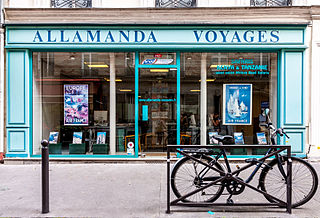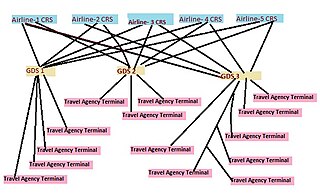Related Research Articles

A travel agency is a private retailer or public service that provides travel and tourism-related services to the general public on behalf of accommodation or travel suppliers to offer different kinds of travelling packages for each destination. Travel agencies can provide outdoor recreation, arranging logistics for luggage and medical items delivery for travellers upon request, public transport timetables, car rentals, and bureau de change services. Travel agencies can also serve as general sales agents for airlines that do not have offices in a specific region. A travel agency's main function is to act as an agent, selling travel products and services on behalf of a supplier. They are also called Travel Advisors. They do not keep inventory in-hand unless they have pre-booked hotel rooms or cabins on a cruise ship for a group travel event such as a wedding, honeymoon, or other group event.
Worldspan is a provider of travel technology and content and a part of the Travelport GDS business. It offers worldwide electronic distribution of travel information, Internet products and connectivity, and e-commerce capabilities for travel agencies, travel service providers and corporations. Its primary system is commonly known as a Global Distribution System (GDS), which is used by travel agents and travel related websites to book airline tickets, hotel rooms, rental cars, tour packages and associated products. Worldspan also hosts IT services and product solutions for major airlines.
Computer reservation systems, or central reservation systems (CRS), are computerized systems used to store and retrieve information and conduct transactions related to air travel, hotels, car rental, or other activities. Originally designed and operated by airlines, CRSs were later extended for use by travel agencies, and global distribution systems (GDSs) to book and sell tickets for multiple airlines. Most airlines have outsourced their CRSs to GDS companies, which also enable consumer access through Internet gateways.
Sabre Global Distribution System, owned by Sabre Corporation, is a travel reservation system used by travel agents and companies to search, price, book, and ticket travel services provided by airlines, hotels, car rental companies, rail providers and tour operators. Originally developed by American Airlines under CEO C.R. Smith with the assistance of IBM in 1960, the booking service became available for use by external travel agents in 1976 and became independent of the airline in March 2000.
Sabre Corporation, a travel technology company headquartered in Southlake, Texas, is the largest global distribution systems (GDS) provider for air bookings. The company's primary product, the Sabre Global Distribution System, and others like it, act as neutral intermediaries, connecting travel suppliers like airlines and hotels with travel sellers like agencies. They offer real-time availability and pricing, making them important for corporate travel management.
A passenger name record (PNR) is a record in the database of a computer reservation system (CRS) that contains the itinerary for a passenger or a group of passengers travelling together. The concept of a PNR was first introduced by airlines that needed to exchange reservation information in case passengers required flights of multiple airlines to reach their destination ("interlining"). For this purpose, IATA and ATA have defined standards for interline messaging of PNR and other data through the "ATA/IATA Reservations Interline Message Procedures - Passenger" (AIRIMP). There is no general industry standard for the layout and content of a PNR. In practice, each CRS or hosting system has its own proprietary standards, although common industry needs, including the need to map PNR data easily to AIRIMP messages, has resulted in many general similarities in data content and format between all of the major systems.
Online hotel reservations are a popular method for booking hotel rooms. Travellers can book rooms on a computer by using online security to protect their privacy and financial information and by using several online travel agents to compare prices and facilities at different hotels.
In airline reservation systems, a record locator is an alphanumeric or alpha code used to identify and access a specific record on an airline’s reservation system. An airline’s reservation system automatically generates a unique record locator whenever a customer makes a reservation or booking, commonly known in the industry as an itinerary. When an itinerary is entered into the reservation system it is commonly known as a passenger name record (PNR). An itinerary may be entered into the system by a passenger, travel agent or airline employee.

Amadeus IT Group, S.A. is a major Spanish multinational technology company that provides software solutions for the global travel and tourism industry. It is the world's leading provider of travel technology that focus on developing software for airlines, hotels, travel agencies, and other travel-related businesses to enhance their operations and customer experiences.

A global distribution system (GDS) is a computerised network system owned or operated by a company that enables transactions between travel industry service providers, mainly airlines, hotels, car rental companies, and travel agencies. The GDS mainly uses real-time inventory from the service providers. Travel agencies traditionally relied on GDS for services, products and rates in order to provide travel-related services to the end consumers. Thus, a GDS can link services, rates and bookings consolidating products and services across all three travel sectors: i.e., airline reservations, hotel reservations, car rentals.
Zonal Employee Discount (ZED) is a multilateral agreement for reduced rate personal travel by airline employees and other travelers. Airlines may bilaterally agree to apply one of three fare levels, space-available / subload and / or positive space / firm reservation status, as well as eligibility for travel in the economy and / or business class cabins.
Airline reservation systems (ARS) are systems that allow an airline to sell their inventory (seats). It contains information on schedules and fares and contains a database of reservations and of tickets issued. ARSs are part of passenger service systems (PSS), which are applications supporting the direct contact with the passenger.
Videcom International Limited is a United Kingdom travel technology company based in Henley-on-Thames. It designs, develops and provides modern computer reservations systems to airlines and the travel industry, specializing in the hosting and distribution of airline sales.
Amadeus is a computer reservation system owned by the Amadeus IT Group with headquarters in Madrid, Spain. The central database is located at Erding, Germany. The major development centres are located in Sophia Antipolis (France), Bangalore (India), London (UK), and Boston. In addition to airlines, the CRS is also used to book train travel, cruises, car rental, ferry reservations, and hotel rooms. Amadeus also provides New Generation departure control systems to airlines. Amadeus IT Group is a transaction processor for the global travel and tourism industry. The company is structured around two key related areas—its global distribution system and its "IT Solutions" business area.
A fare basis code is an alphabetic or alpha-numeric code used by airlines to identify a fare type and allow airline staff and travel agents to find the rules applicable to that fare. Although airlines now set their own fare basis codes, there are some patterns that have evolved over the years and may still be in use.
Travicom was the trading name of Travel Automation Services Ltd, a travel technology company based in the United Kingdom providing a global distribution system between airlines and travel agencies.
Infini is a computer reservations system based in Japan which provides its services in the Japanese market. It was created in 1990 by All Nippon Airways and Abacus (GDS) who currently own 100% of Infini. It utilises technology from Sabre Holdings to provide booking and ticketing capabilities to travel agencies in Japan.
Axess (アクセス国際ネットワーク) is a computer reservations system based in Japan which provides its services in the Japanese market. It originated as the IT department of Japan Airlines called Jalinfotech. In 1991 it was established as an independent company it began to be marketed to travel agencies in Japan. In 1995 Axess partnered with Sabre Holdings in order to provide travel agencies in Japan with booking and ticketing capabilities for a wider range of international airlines.
The Electronic Miscellaneous Document (EMD) is an International Air Transport Association (IATA) standard for electronically documenting ancillary revenue; that is, all other sales and transactions between airlines and passengers besides electronic tickets. It is a step toward moving the airline industry to purely electronic transactions in the business-to-consumer context.
In the aviation industry, a pseudo city code,pseudo-city code, or office ID, is an alpha-numeric identifier for a corporate user of a computer reservation system (CRS) or global distribution system (GDS), typically a travel agency. The codes are typically 3 or 4 characters long,, and are unique to a specific office of a travel agency. They are used to associate each agency's bookings with the agency, and also to identify private fares available to the agency.
References
- ↑ United States Department of Transportation: Computer Reservations System (CRS) Archived 2008-05-27 at the Wayback Machine
- ↑ Salpukas, Agis (July 10, 1987). "United Air In Venture In Europe". The New York Times. Retrieved May 3, 2010.
- 1 2 Two top airline reservations systems to be merged. Baltimore Sun (1992-03-04). Retrieved on 2013-08-20.
- ↑ Dictionary of Travel and Tourism, Books.Google.com
- ↑ Travicom and Galileo User Group
- ↑ Leisure Marketing, Books.Google.com
- ↑ Flight Global, Flithglobal.com
- ↑ Strauss, Michael (2010): Value Creation in Travel Distribution, https://www.amazon.com/dp/0557612462
- Klein, S.; T. Langenohl (1994). "Coordination Mechanisms and Systems Architectures in Electronic Market Systems" (PDF). Proceedings. International conference on Information and communications technologies in tourism. Springer Verlag New York, Inc. pp. 262–270. ISBN 0-387-82543-6. Archived from the original (PDF) on 2008-12-09.